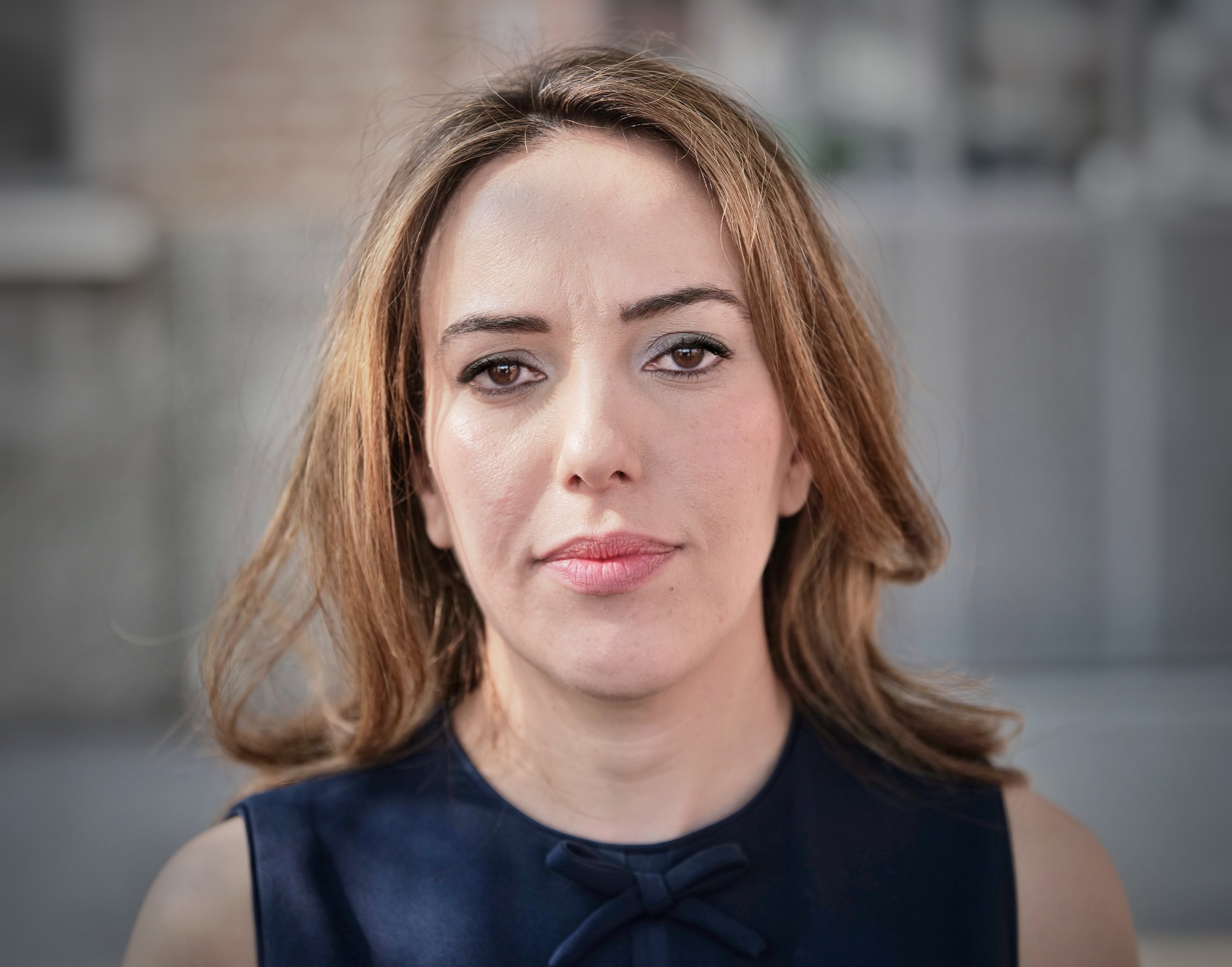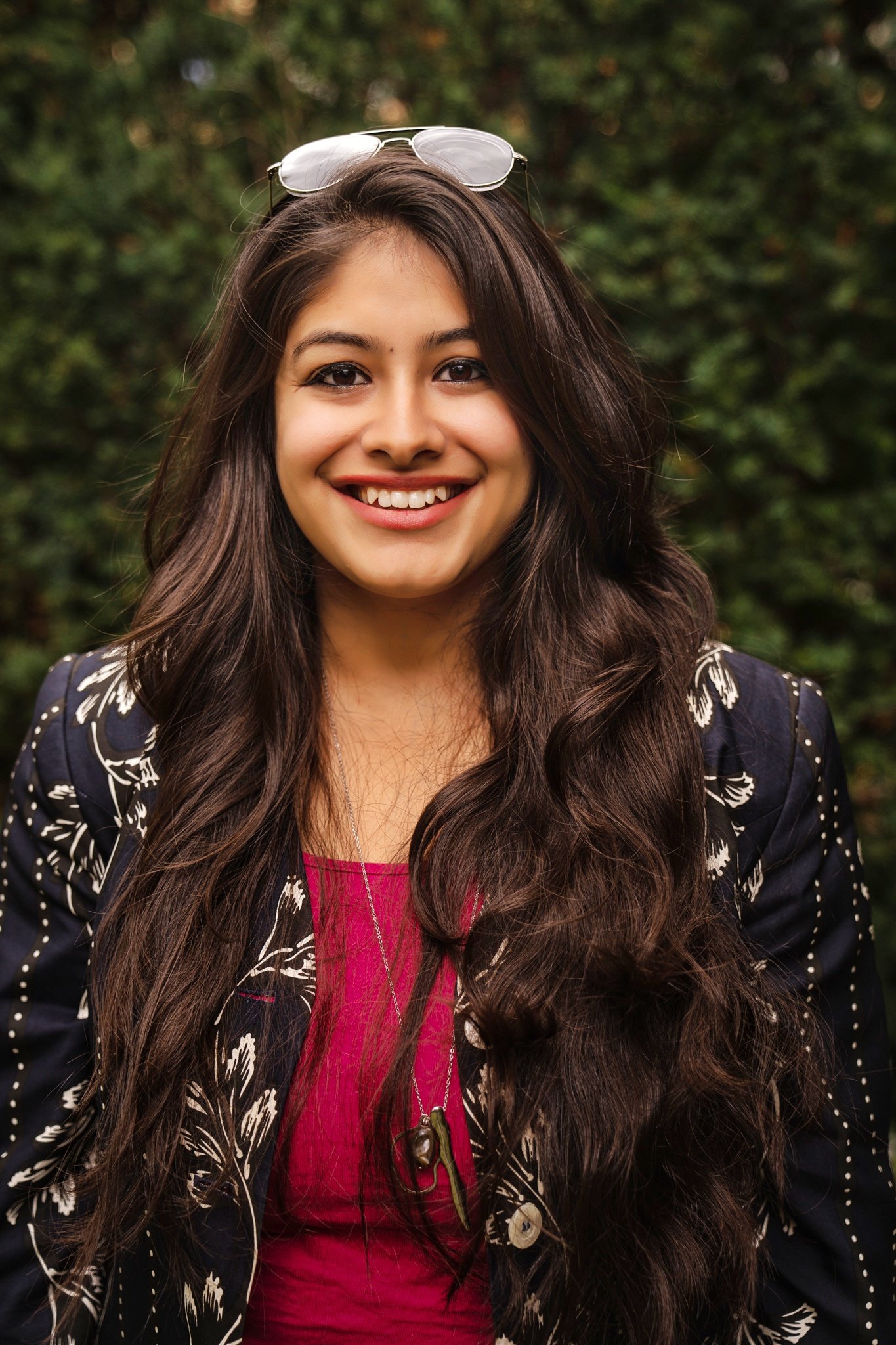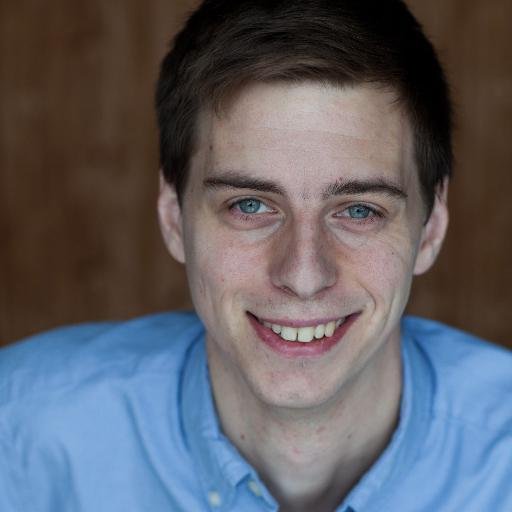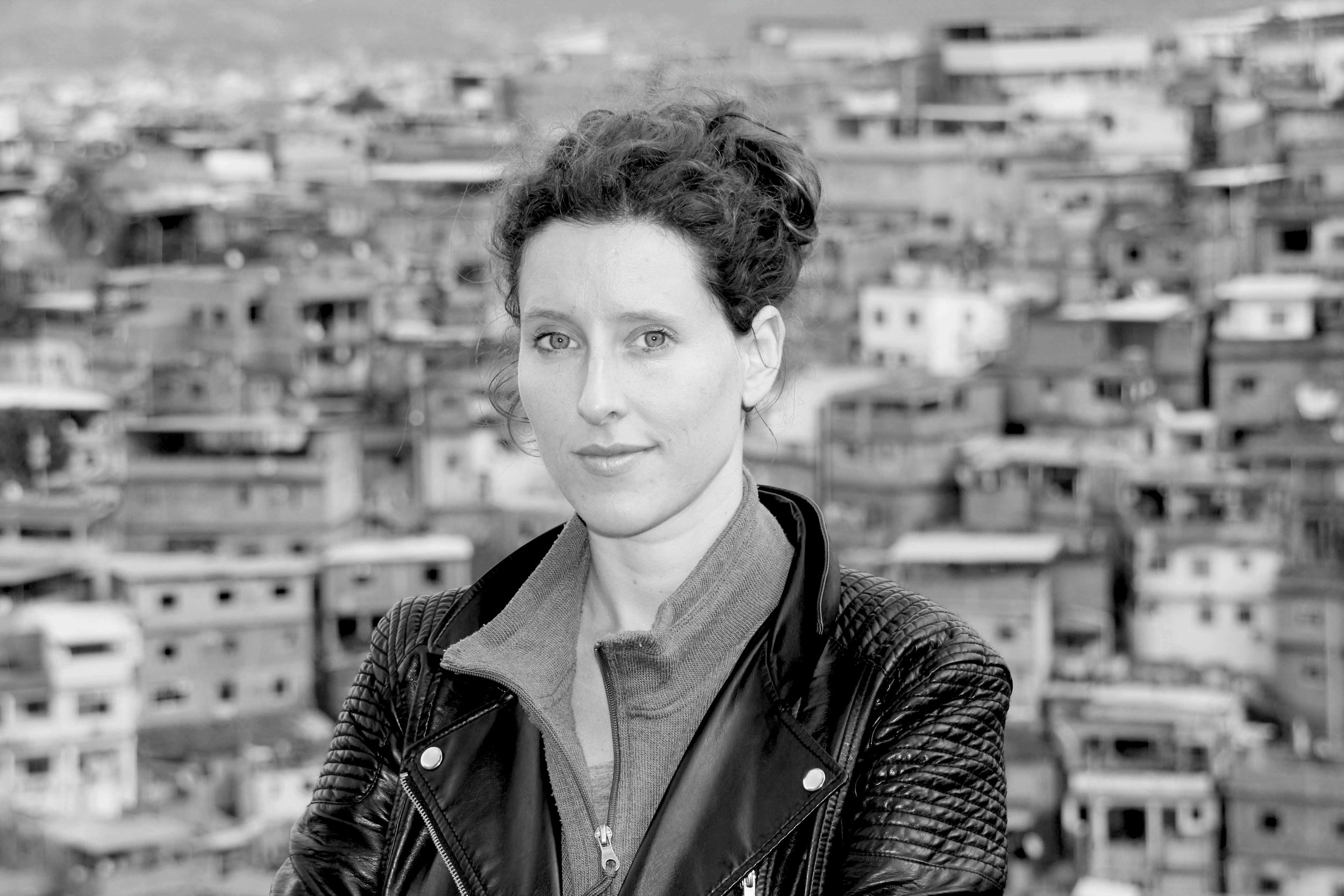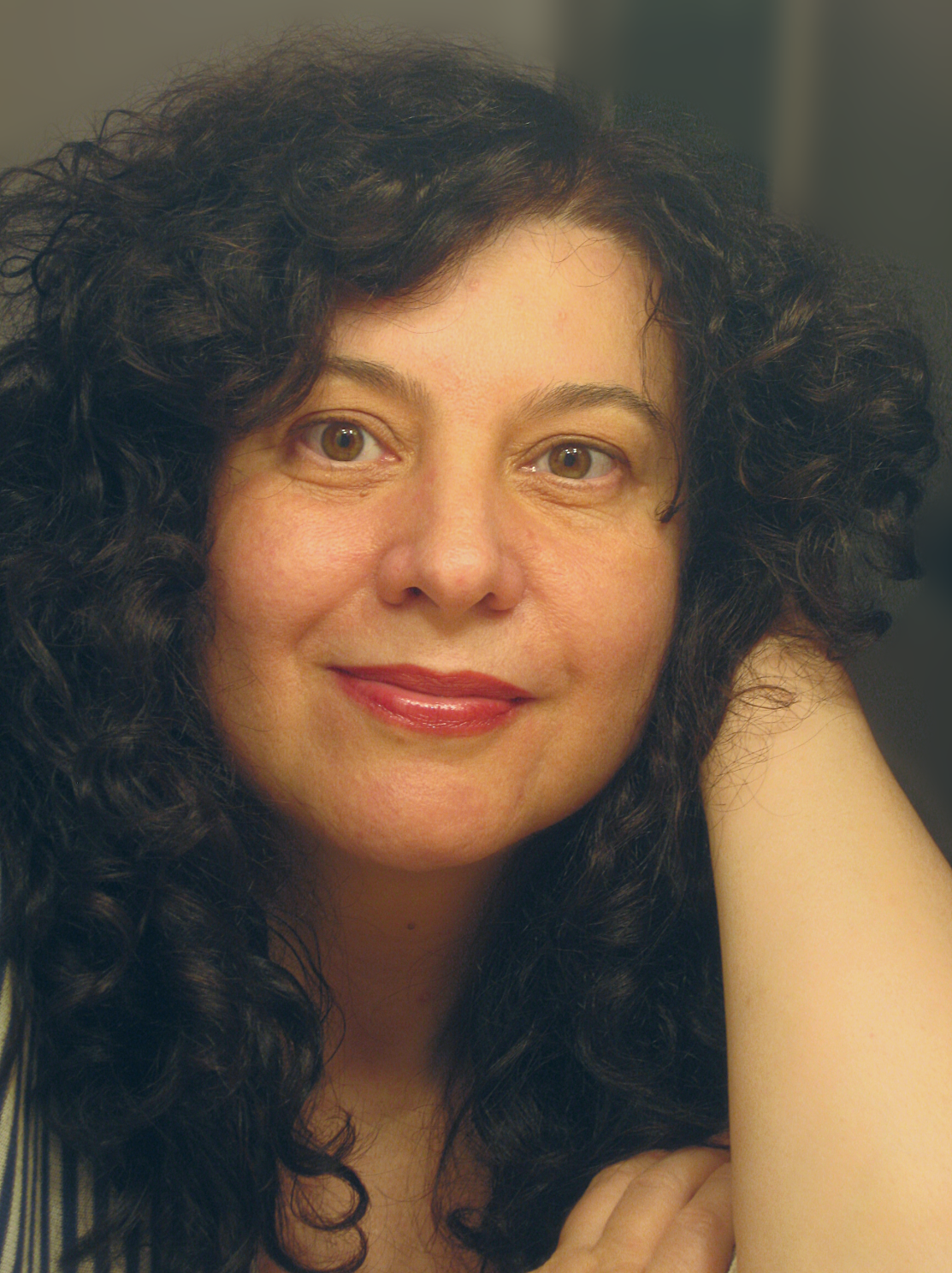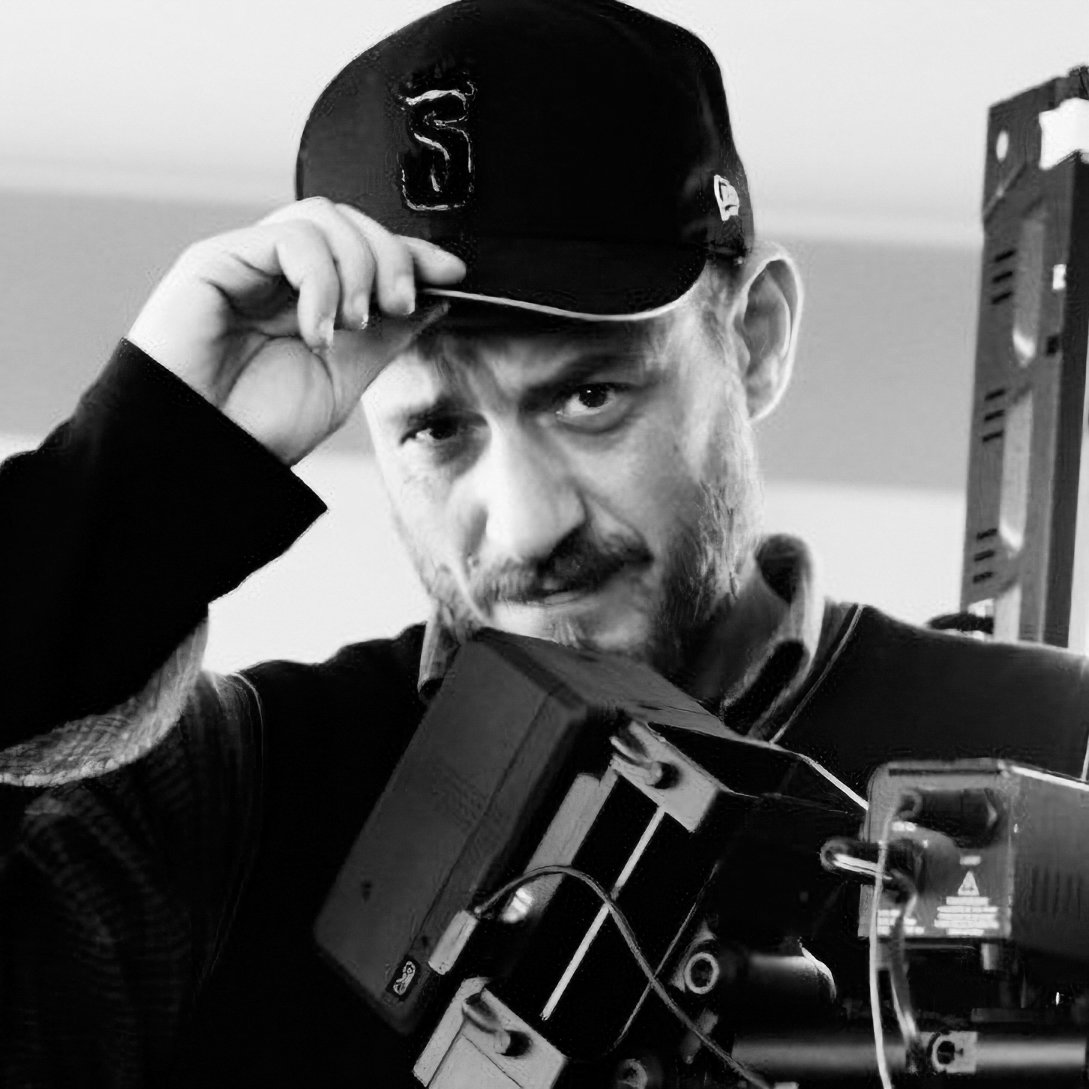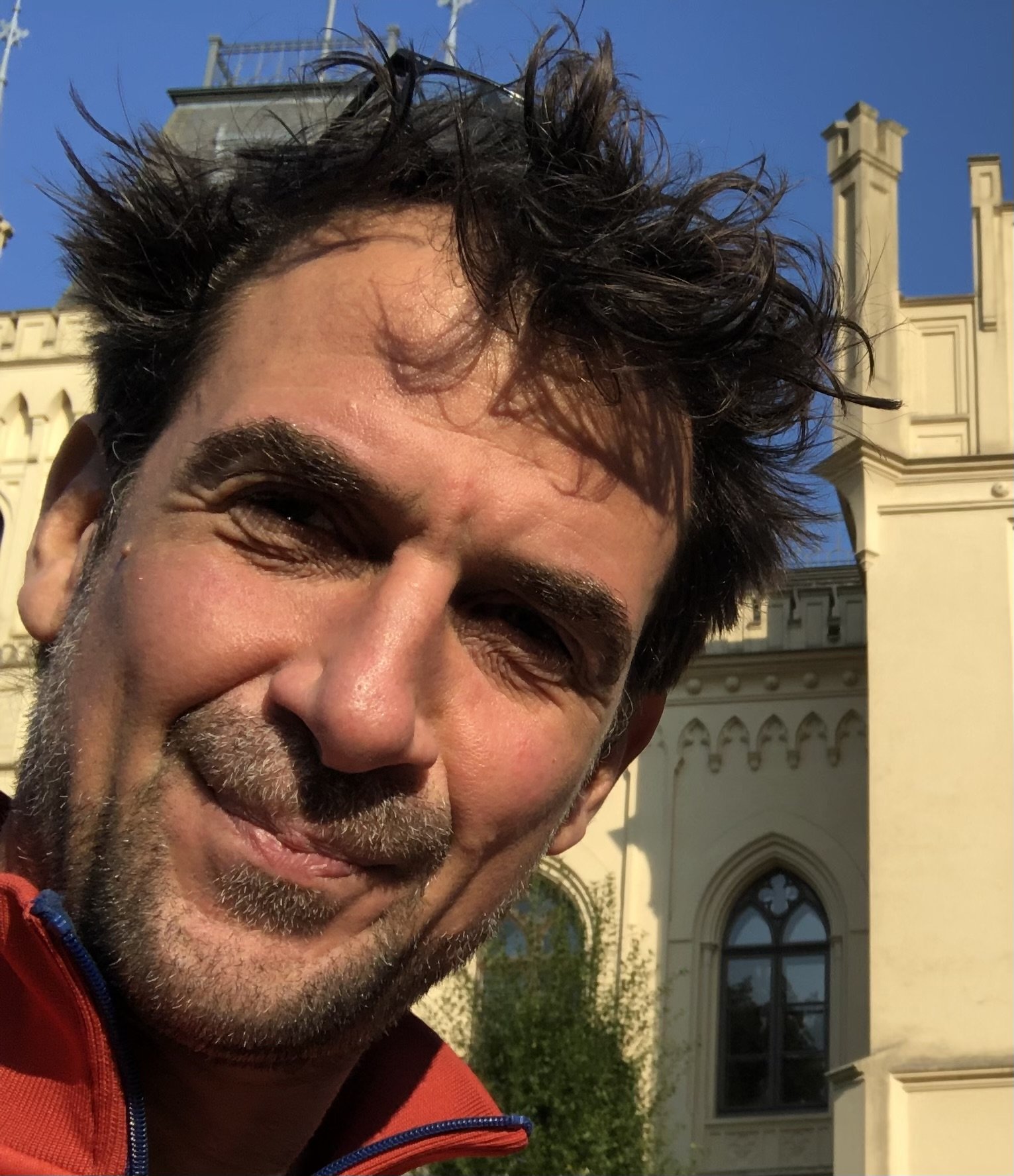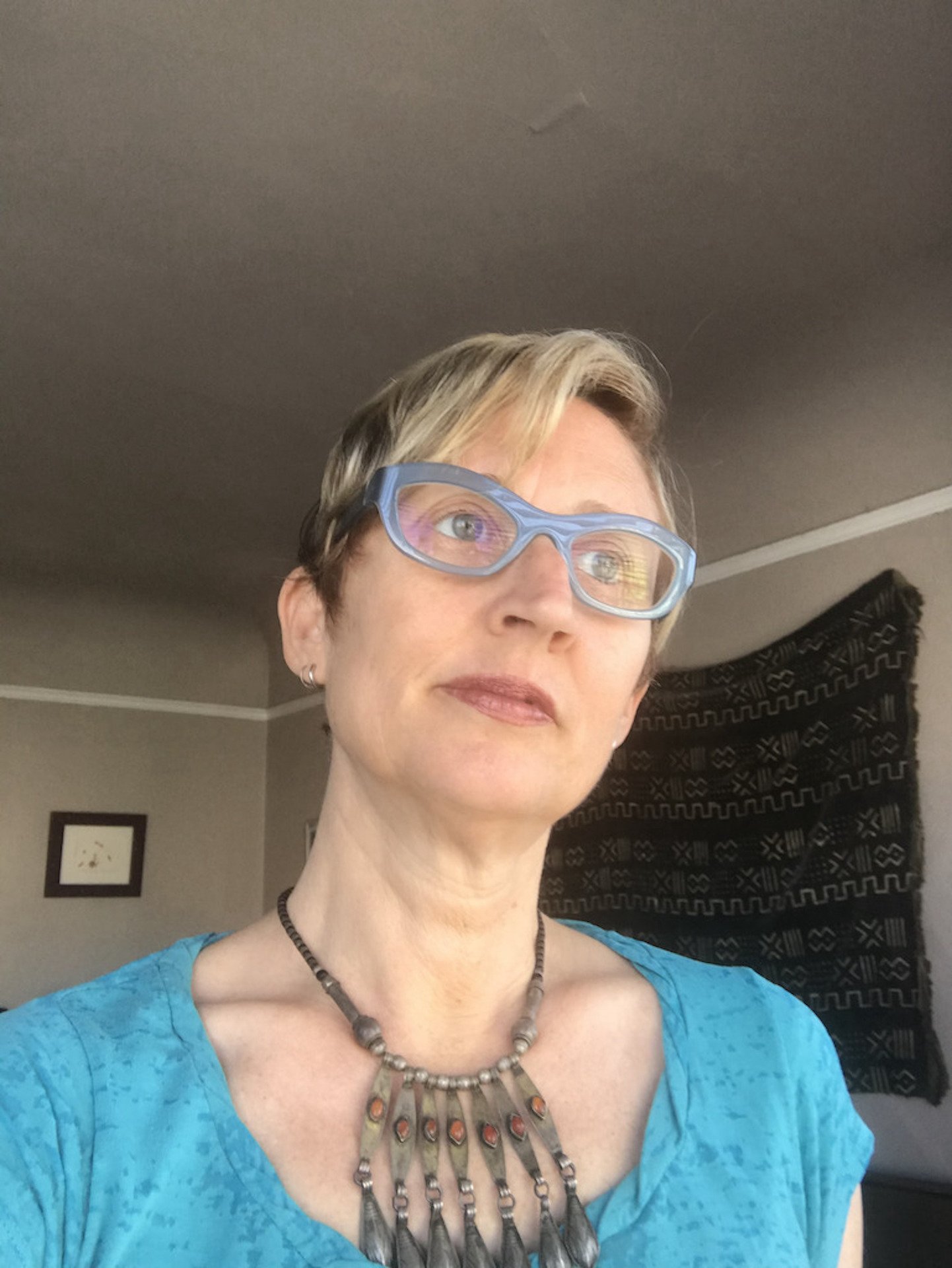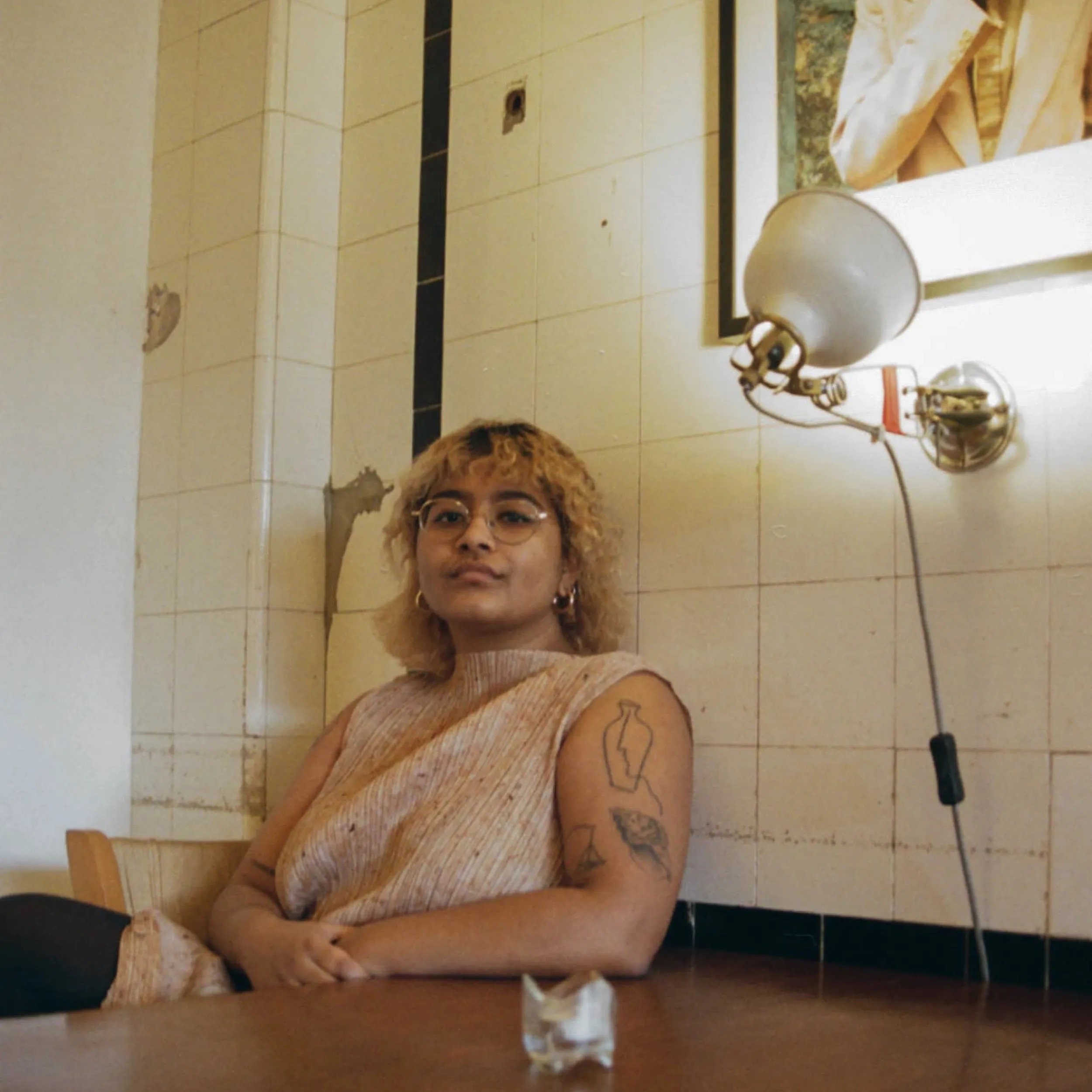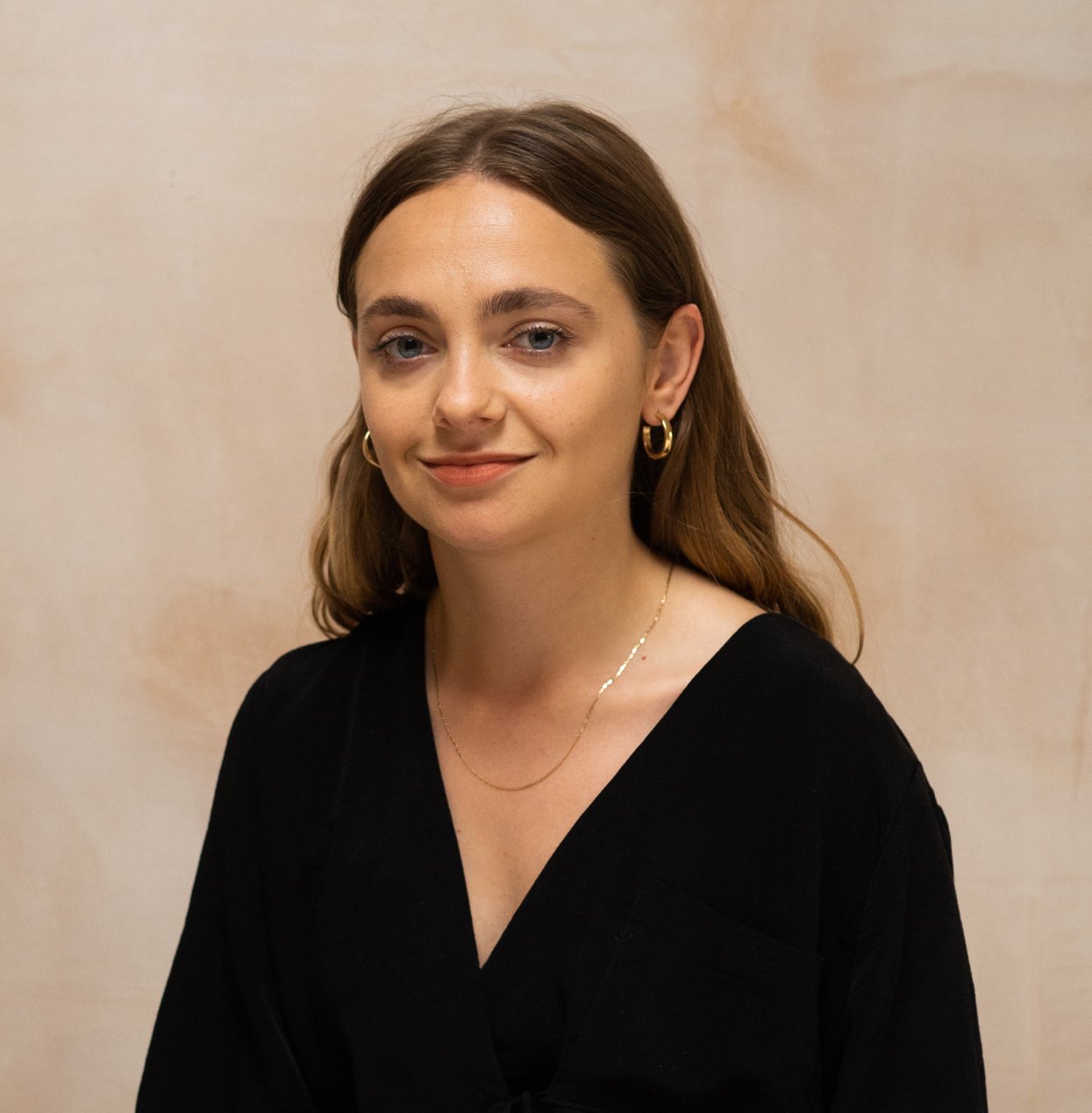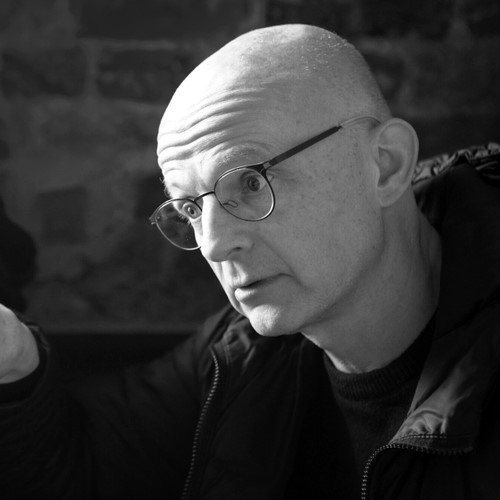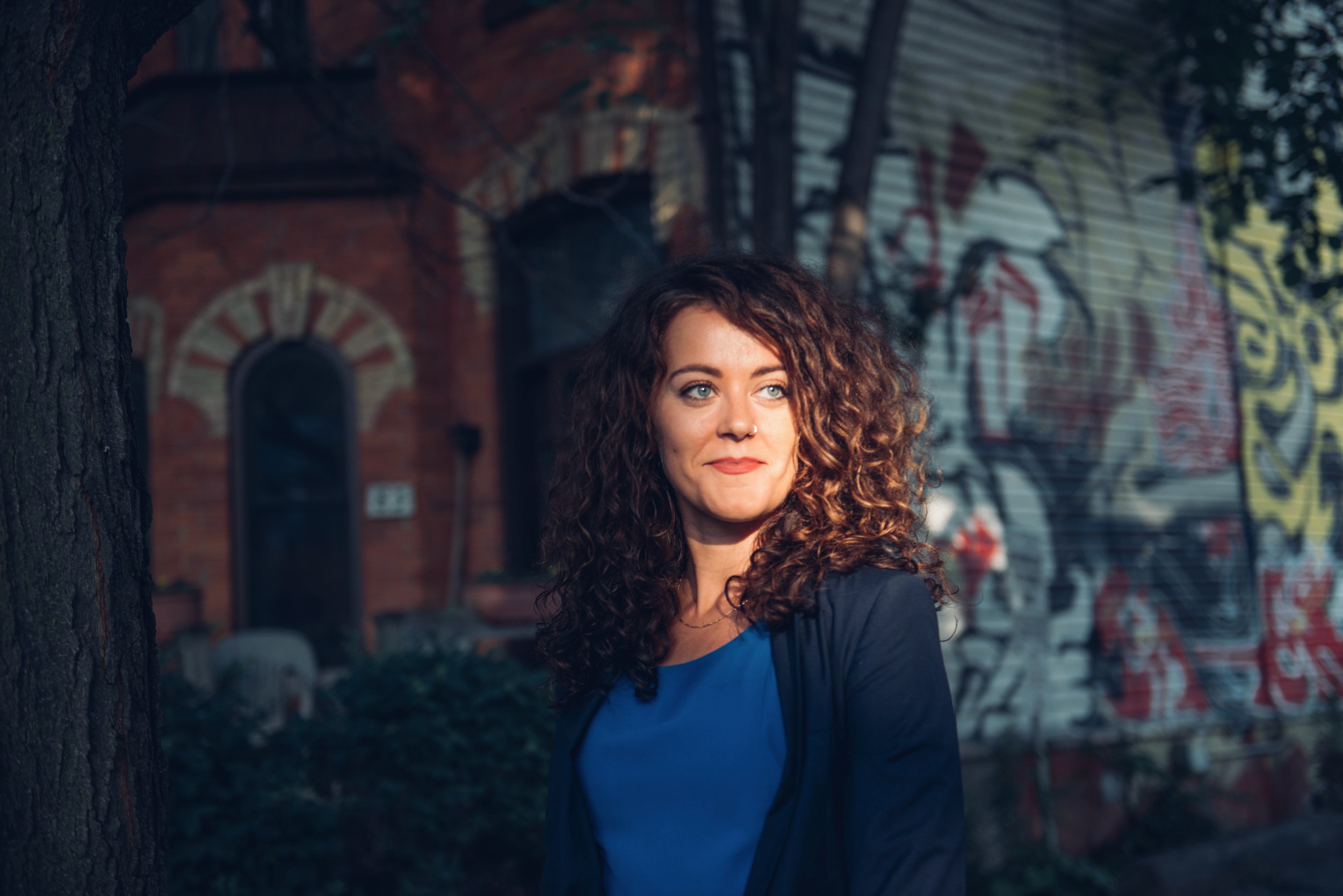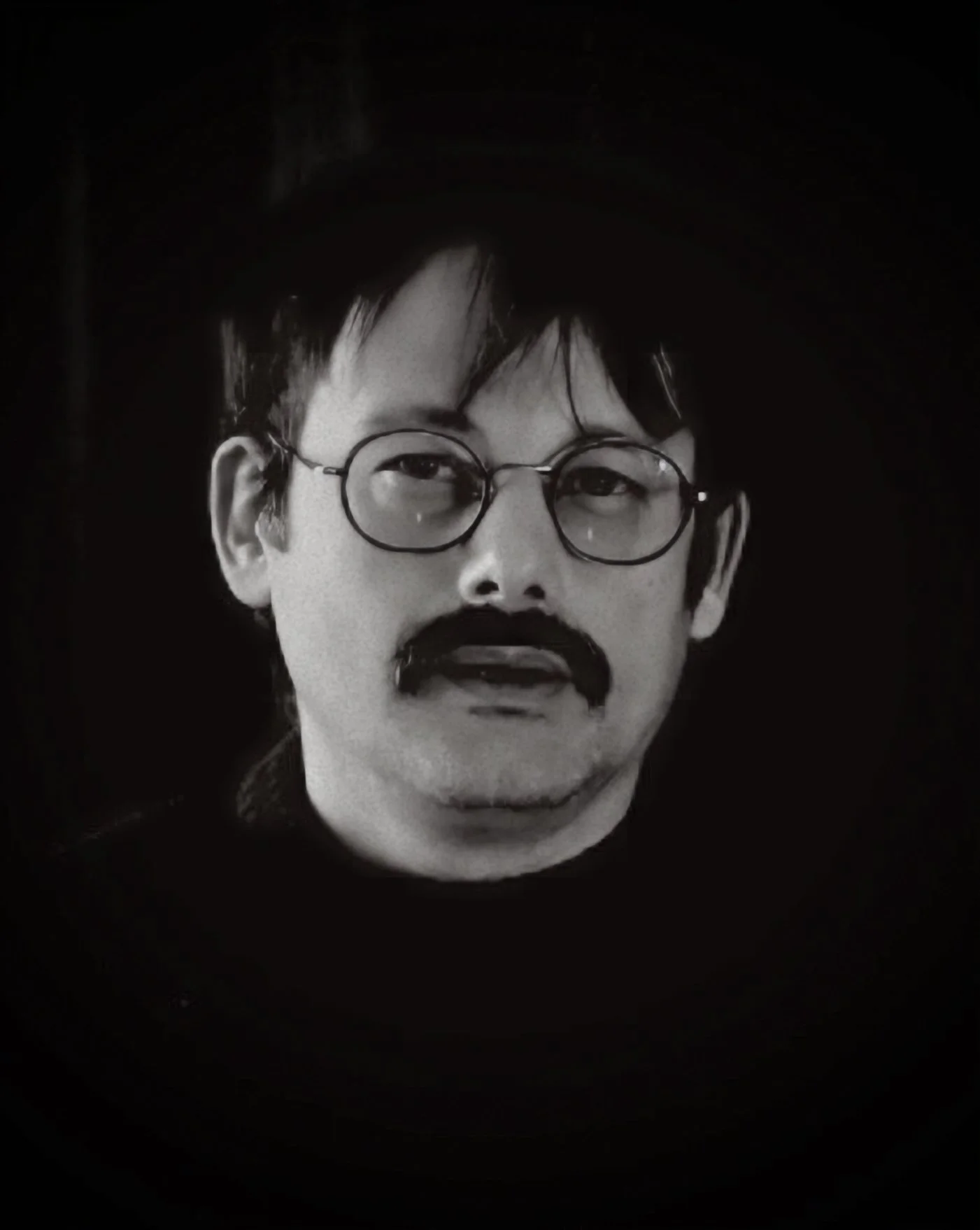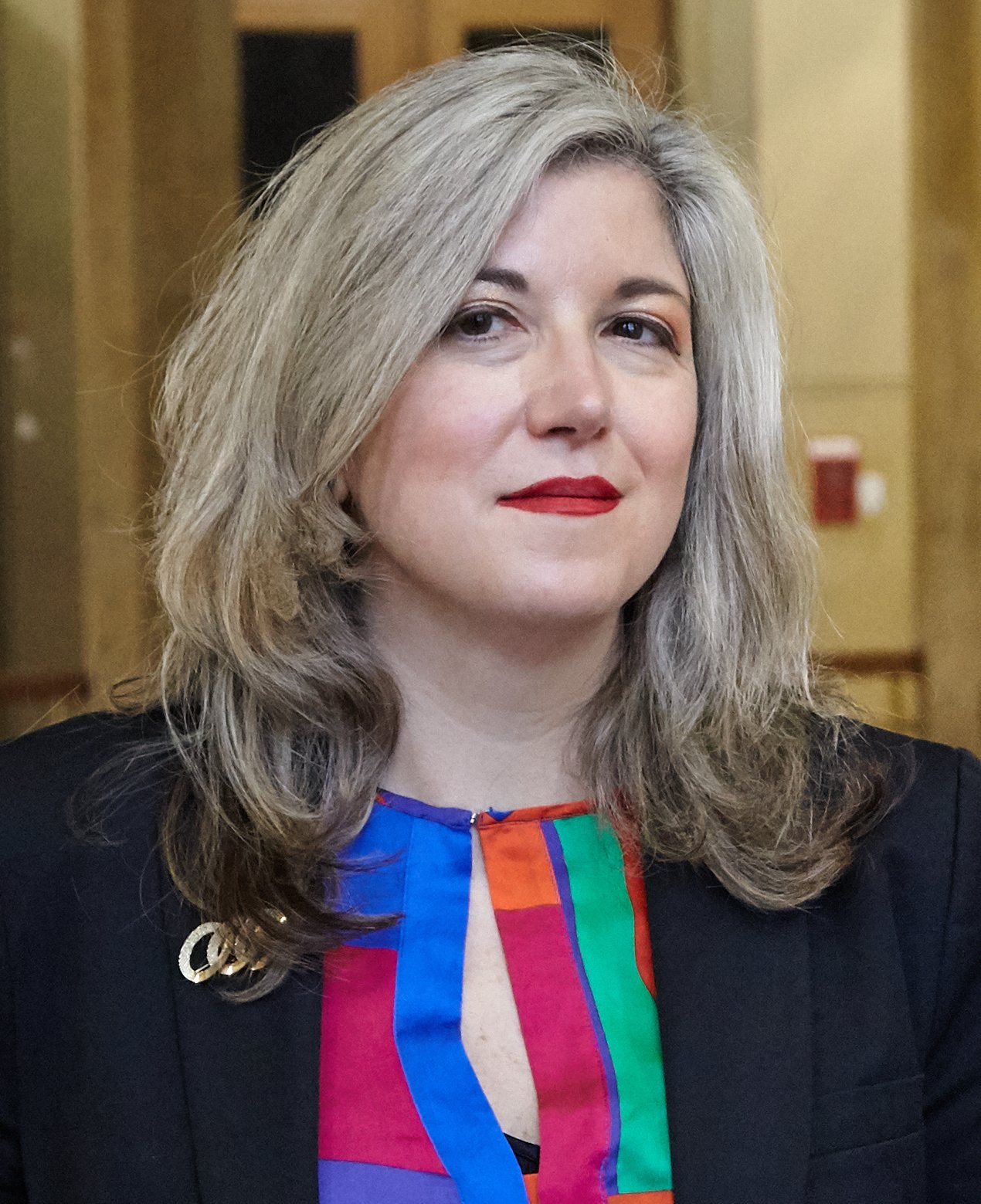#DNL29 · March 24–26 · 2023
SMART PRISONS
Tracking, Monitoring & Control
THE 29TH CONFERENCE OF THE DISRUPTION NETWORK LAB
KUNSTQUARTIER BETHANIEN - BERLIN & STREAMING
FRIDAY TICKETS NOW AVAILABLE AT THE VENUE (STUDIO 1 - KUNSTQUARTIER BETHANIEN)
FOLLOW THE STREAMING FOR FREE ON THIS WEBPAGE ON march 24–25. THE SCREENING AND WORKSHOPS ARE NOT STREAMED. NO TICKETS ARE NEEDED TO WATCH THE STREAMS.
Video · Insight Reports · Schedule · Introduction · Full Programme · Screening · Workshops · Artistic Production · Tickets · Press · Speakers
SMART PRISONS · Videos
Constellations of Offshore Detention · Adnan Softić, Jens Kambeck, Sean Vegezzi, Tatiana Bazzichelli
Are Algorithms and Borders the New Jailers? · Srishti Jaswal, Sanjana Varghese, Petra Molnar, Fiamma Montezemolo, Sonja Peteranderl
Revisiting the Genoa G8 2001: Another World is Possible, and it Needs Another Kind of Computing · Carlo A. Bachschmidt, MF, Dan McQuillan, Tatiana Bazzichelli · Transcript of C. A. Bachschmidt talk
Targeted by Surveillance: Julian Assange, WikiLeaks & Networked Repression · Stella Assange, Kevin Gosztola, Stefania Maurizi
Investigating systems of surveillance around prisons, detention centres and borders, and the effects of technological violence and discrimination directed at migrants, activists, and dissidents in Europe and worldwide.
29th conference of the Disruption Network Lab. Curated by Tatiana Bazzichelli.
LOCATION: STUDIO 1, KUNSTQUARTIER BETHANIEN, MARIANNENPLATZ 2, 10997 BERLIN
STREAMED FOR FREE
Insight Reports
by Barrett Brown & Jacopo Anderlini
After SMART PRISONS: Tracking, Monitoring & Control, Disruption Network Lab commissioned two texts to inform debates and influence civic society: a primary source insight by writer and activist Barrett Brown, "Pox Americana: Seeking Asylum from a Deteriorating Democracy", and an empirical research analysis by researcher Jacopo Anderlini on tracking and monitoring at European borders, "The European Digital Border. Narratives on technology and practices of control in the governing of migrant mobilities".
In 2011 and 2012, Barrett Brown worked with Anonymous on campaigns involving the Tunisian revolution, state misconduct, and other issues. In 2012 he was as arrested and later sentenced to four years in federal prison on charges stemming from his investigations into HBGary, Stratfor, Palantir, Archimedes, and other firms that would later be implicated in election interference operations in the US and UK. Upon his release in late 2016, he established the non-profit Pursuance to develop a platform for mass civic engagement.
Jacopo Anderlini is a postdoctoral researcher at the University of Parma, he is part of the Visual Sociology Laboratory of the University of Genoa, as well as systems / operations engineer at Tactical Tech. His main research interests revolve around border studies, refugee studies, migration, critical theory on technologies, social and political philosophy. His work mixes qualitative methods and ethnography.
Funded by Allianz Foundation and curated by Tatiana Bazzichelli.
Pox Americana: Seeking Asylum from a Deteriorating Democracy (pdf) · Barrett Brown
The European Digital Border: Narratives on technology and practices of control in the governing of migrant mobilities (pdf) · Jacopo Anderlini
Watch: Disruptive Fridays on Smart Prisons
Two online panels of the Disruptive Fridays series. Opening Prisons (November 4, 2022) and Algorithms of Violence (December 2, 2022) discussed prison surveillance, border control, migration tracking and monitoring through artistic practices and ethical implications of emerging technologies.
Back to top
Schedule
Friday March 24, 2023
16:30 · Doors open
17:00 – 17:15 · OPENING & INTRODUCTION
Tatiana Bazzichelli (Artistic Director, Disruption Network Lab, IT/DE).
17:15 – 18:45 · PANEL: Constellations of Offshore Detention
Sean Vegezzi (Artist and Researcher, US - short film), Adnan Softić (Artist, BA/DE), Jens Kambeck (Attorney at Law, DE). Moderated by Tatiana Bazzichelli (Artistic Director, Disruption Network Lab, IT/DE).
19:10 – 19:30 · VIDEO ESSAY · Traces
By Fiamma Montezemolo, Critical Times, 2012
19:30 – 21:30 · PANEL: Are Algorithms and Borders the New Jailers?
Srishti Jaswal (Journalist, IN), Sanjana Varghese (Investigator at Airwars, Journalist, UK), Petra Molnar (Associate Director, Refugee Law Lab / Co-creator, Migration and Technology Monitor, CA/US), Fiamma Montezemolo (Artist and Anthropologist, IT/US). Moderated by Sonja Peteranderl (Journalist, DE).
Saturday March 25
16:00 · Doors open
16:30 – 18:30 · PANEL: Revisiting the Genoa G8 2001: Another World is Possible, and it Needs Another Kind of Computing
Carlo A. Bachschmidt (Film Director, IT), MF (Social Worker, IT/DE), Dan McQuillan (Lecturer in Creative and Social Computing, UK). Moderated by Tatiana Bazzichelli (Artistic Director, Disruption Network Lab, IT/DE).
19:00 – 20:15 · PANEL: Targeted by Surveillance: Julian Assange, WikiLeaks & Networked Repression
Stella Assange (Julian Assange's wife, Lawyer, UK), Kevin Gosztola (Journalist, Dissenter Newsletter Editor, US). Introduced and moderated by Stefania Maurizi (Investigative Journalist, IT).
20:15 – 22:00 · SCREENING · Ithaka
Documentary (2022) ‧ 1h 46m. Director: Ben Lawrence, Producers: Gabriel Barber Shipton, Adrian Devant, Music composed by: Brian Eno, Cinematography: Niels Ladefoged, Editor: Karen Johnson. With John Shipton, Stella Assange, Vivienne Westwood, Ai Weiwei, John Pilger.
Sunday March 26
11:30 – 13:30 · WORKSHOP · ISIS Prison Break: Deploying Open Source and Visual Methods for Investigations
With: Imogen Piper (Motion Graphic Reporter, formerly Airwars, now Washington Post, UK) and Sanjana Varghese (Investigator at Airwars, Journalist, UK), In cooperation with Airwars.
14:30 – 17:30 · WORKSHOP · G8 Genoa 2001: A Grassroots Media Forensics Toolbox
With: Carlo A. Bachschmidt (Film Director, IT) and Manolo Luppichini (Filmmaker & Author, IT).
Back to top
Introduction
SMART PRISONS: Tracking, Monitoring & Control
Investigating systems of surveillance around prisons, detention centres and borders, and the effects of technological violence and discrimination directed at migrants, activists, and dissidents in Europe and worldwide.
A programme of talks, workshops, artistic production, and online panels curated by Tatiana Bazzichelli.
Funded by:
Senatsverwaltung für Kultur und Europa (Senate Department for Culture and Europa, Berlin), The Reva and David Logan Foundation, Allianz Foundation, Open Society Foundations. Part of New Perspectives for Action. A project by Re-Imagine Europe, co-funded by the European Union.
In cooperation with: Global Voices. Collaboration Partner: Airwars. Partner Venue: Kunstraum Kreuzberg /Bethanien. Outreach Partner: Aksioma, Institute for Contemporary Art Ljubljana, don’t extradite assange. Media Partners: taz, Il Mitte, Exberliner. Streaming partner: Boiling Head Media.
Machine learning, image and speech recognition, semantic analytics and algorithmic policing are developing the future of prison systems. These types of networked technologies, from connected sensors, tracking wristbands, and data analytics, are progressively being used to recognise and track prisoners, individual locations, and activities of potential targets.
In the Chinese Yancheng prison, a system of networked cameras and hidden sensors developed by private corporations and public research, uses 24 hour facial recognition and movement tracking, generating daily behavioral analysis reports on all 1600 prisoners, flagging anything deemed suspicious or abnormal.
In the U. S., several tech companies have helped developing surveillance systems, such as Amazon’s Rekognition software, which has already been sold to police departments, expanding the government’s surveillance capabilities. Also in Europe, surveillance and monitoring technologies including cameras, drones, biometrics, and motion sensors, are in use to control and monitor borders, to stop unwanted migration and to track migrants in detention centers.
Although automatised technologies of tracking, monitoring and surveillance are developing at a fast pace, there is nothing radically new in the integration of networks of tracking, monitoring and control for surveillance and detention of potential targets. The conference SMART PRISONS: Tracking, Monitoring & Control traces back the creation of “algorithms of security” through the past twenty years, reflecting on the effects of technological violence and surveillance directed at migrants, activists, and dissidents in Europe and worldwide. If an algorithm is a set of step-by-step procedures, what has been implemented in the post-9/11 society, has been a process of controlling dissent by enforcing new sets of shared rules, making security an integrated part of our daily lives.
Alongside ethical questions around the abuse of privacy, these technological implementations need to be analysed to hold governments and corporations accountable and socially responsible. Deploying automatised technologies may increase problems of bias, discrimination, and wrongful punishments, and raise psychological pressures to conform, furthering a culture hostile to dissent.
SMART PRISONS looks at how specific targets, whether prisoners, migrants at borders, or dissidents, have been progressively marginalised, trapped inside prison facilities, detention centres, or within systems of automatised control, being labeled as threats or suspects, due to intersectional biases or critical political activity. The concept of “smart” should not be interpreted as purely technological, but as an integrated system of tracking, monitoring and control, encompassing bureaucracy, power, psychology and propaganda, accelerated by technology over the last decades.
While automatised discrimination and human rights violations of “unwanted” people is already a fact, this conference also aims to propose possible solutions and future developments in the field of counter-surveillance, civic technologies and grassroots investigations.
The conference connects artists, activists, human rights advocates, tech experts, and critical thinkers around the topics of automatised tracking and surveillance in the framework of prisons and detention centres through a multiplicity of experiences, investigations, and researches: Sean Vegezzi, a New-York born artist who has examined New York City’s topography since 9/11, presents his new artistic production, a short film documenting the Vernon C. Bain Center (VCBC), an 800-bed, 191-meter floating detention facility anchored off the Bronx's southern shore, across from Rikers Island; the story of Srishti Jaswal, an independent journalist based in India that became the target of right-wing trolls on the internet and wrote an extensive reportage on their modus operandi; the 10-years long grassroots forensic investigation of Segreteria Legale (The Legal Secretariat) related to the G8/Genoa events of 2001 in Italy, set up to assist lawyers in the trials of protesters, and to investigate the police brutality and torture of protesters at Diaz and Bolzaneto, the killing of Carlo Giuliani, and other incidents during the street demonstrations; and finally the case of Julian Assange, through a panel with Stella Assange (among others) and the screening of Ithaka which revolves around Assange’s persecution, trial and incarceration at the Belmarsh high-security prison in the United Kingdom since April 2019, and the looming threat of extradition to the United States, facing prosecution under the draconian Espionage Act
The programme SMART PRISONS: Tracking, Monitoring & Control started in the fall of 2022 with a series of events leading up to the conference. Alongside the Disruption Network Lab’s commissioned artistic production by Sean Vegezzi, two online panels of the Disruptive Fridays series, Opening Prisons (November 4, 2022) and Algorithms of Violence (December 2, 2022), discussed prison surveillance, border controls, migration tracking and monitoring, and how the implications of these systems and emerging technologies can be investigated through artistic practices.
After the conference, Disruption Network Lab will release a report by Sean Vegezzi to summarise the findings of his artistic project on the Vernon C. Bain Center (VCBC), as well as two short pieces on tracking and monitoring at detention centers, with primary source insights to inform debates in the field and influence civic society.
This conference follows a path of multiple years at the Disruption Network Lab in relation to the critical analysis of AI, surveillance and human rights, including the conferences Drones (April 2015), Bots (April 2016), Prisoners of Dissent (May 2017), Terror Feeds (November 2017), AI Traps (June 2019), Citizens of Evidence (September 2019) Data Cities (September 2020), Borders of Fear (November 2020) and, most recently, The Kill Cloud (March 2022).
Back to top
Full Programme
Friday March 24, 2023 · Get tickets
16:30 · Doors open
17:00 – 17:15 · OPENING & INTRODUCTION
Tatiana Bazzichelli (Artistic Director, Disruption Network Lab, IT/DE).
17:15 – 18:45 · PANEL
Constellations of Offshore Detention
Sean Vegezzi (Artist and Researcher, US - short film), Adnan Softić (Artist, BA/DE), Jens Kambeck (Attorney at Law, DE). Moderated by Tatiana Bazzichelli (Artistic Director, Disruption Network Lab, IT/DE).
This panel discusses research-based works influenced by a broader notion of technology, which is not merely attached to technical devices. At the focus of the debate are offshore detention facilities as a specific technological application of systemic knowledge, and as a contemporary technique of border demarcation, surveillance, and control of society. The speakers reveal a direct link between the facilities they have studied and examine the logistics behind rendering humans stateless in exterritorial spaces and maritime geographies.
New York based artist Sean Vegezzi has developed a new artistic project on New York City’s carceral and policing infrastructure, focusing on a floating detention site used to hold inmates for the New York City Department of Correction. The Vernon C. Bain Center (VCBC) is an 800-bed, 191-meter floating detention facility moored in the East River within the Hunts Point section of the South Bronx. It functions as an auxiliary of the Rikers Island jail complex and is the primary facility for the criminal court intake in the Bronx. Worldwide, VCBC is the only floating structure that was ever purpose-built as a detention facility. It has a projected closure date within 2027. Sean Vegezzi will showcase a corrected history of VCBC through a new video work commissioned by Disruption Network Lab, VCBC: Christening, featuring the only known surviving video documentation of the vessel's christening ceremony in 1991.
This short film will be brought in conceptual dialogue with the work of artist Adnan Softić, who lived in a floating "accommodation barge" – the Bibby Challenge, a cross between a cruise ship and container ship – set up by German authorities on the river Elbe in Hamburg to accommodate refugees fleeing the Bosnian War. These mobile housing units can be easily used when required, dismantled without leaving a trace or easily relocated. In their artistic work, of which a video excerpt will be shown, Adnan Softić and Nina Sofitć engage with the phenomenon of extraterritoriality. The well-known dichotomy “refugees and water” appears in a new form, and the interest of the state becomes visible to maintain the invisible condition of the refugees.
Prisons are a tool of legal enforcement and play a role in all legal systems. Jens Kambeck talks about special prisons in different countries and introduces the example of the airport procedure for asylum seekers in Germany. Comparing daily procedures in selected prisons in different countries worldwide, he examines the range between right-based-approaches to the economy of scarcity. In a short excurse to legal sociology and legal theory, the concept of legal pluralism and the legal kite (based on state law, international law, customary law and religious law) is introduced.
This panel is in solidarity with Take Back the Bronx in protest against the existence of the Vernon C. Bain Center (VCBC) and for prison abolition at large. TBBX is a grassroots organization actively supporting the detainees within New York City's floating detention facility and demanding its closure.
19:10 – 19:30 · VIDEO ESSAY
Traces
Fiamma Montezemolo, Critical Times, 2012
In her experimental twenty-minute video-essay, the artist and anthropologist Fiamma Montezemolo combines fieldwork-based research and art to create a meditation on border life between the United States and Mexico. Based on years of ethnographic work in Tijuana and an ascetic shooting schedule of twenty-four hours, Traces records Montezemolo's experiences in the region in a textured living portrait, a sort of biography, of the wall that separates Tijuana and San Diego. Images of a rusty wall, unruly topography, decaying surveillance structures, furtive moments of undocumented migrant crossings, and dystopian landscapes are interwoven with a mournful voice-over enunciated from a different time and place. The fate of the wall is sealed: its remains are to be collected like forensic evidence by a visitor, perhaps another anthropologist and artist, perhaps another undocumented migrant, from the future.
19:30 – 21:30 · PANEL
Are Algorithms and Borders the New Jailers?
Srishti Jaswal (Journalist, IN), Sanjana Varghese (Investigator at Airwars, Journalist, UK), Petra Molnar (Associate Director, Refugee Law Lab / Co-creator, Migration and Technology Monitor, CA/US), Fiamma Montezemolo (Artist and Anthropologist, IT/US). Moderated by Sonja Peteranderl (Journalist, DE).
This panel focuses on systems of tracking and monitoring towards marginalised communities, connecting four different points of analysis. From one side, it will analyse how minorities and migrants are monitored via automated technologies in prisons and in border detention centres; from the other side, it reflects on the conceptual meaning of borders and prisons, bringing to light stories of technological surveillance and oppression, as well as imagining how the experience of dividing barriers could be a starting point for new forms of resistance.
Srishti Jaswal, award-winning journalist based in India, talks about her own experience of being trapped in what she calls a virtual prison after being trolled to an extent by Hindu Far-Right that she had to abandon her identity to survive. Eventually as she started investigating the Hindu Far right- trolls and troll farms in India, she was forced to live in hiding for nearly three months apprehending arrest from the Indian police. Her investigation throws light on how trolls are recruited and trained in India and unleashed on journalists, activists, lawyers from marginalized communities to force them into a virtual prison. Now her investigation is the subject of her book: Post at Your Own Risk, commissioned by Pan Macmillan (forthcoming 2024). The book goes beyond her own experience and studies how political trolling in India has now become an indispensable tool.
Sanjana Varghese, investigator at Airwars, addresses the extension of the borders and prison systems through technology and new forms of monitoring and surveillance; focusing closely on the relationship between carcerality, temporality and data infrastructures that are used by the UK government to monitor populations it deems suspect; notably migrants and people of color. She also connects these ongoing shifts to increasing privatization and automation within state services.
Petra Molnar focuses on carceral technologies of immigration detention. Practices of border violence increasingly rely on high-risk technological experiments, including carceral technologies used in immigration detention. Voice—printing, phone surveillance, and electronic ankle shackles are just some of the more recent tools that states use to detain people on the move. Certain places like refugee camps and detention centres serve as testing grounds for new technologies, because regulation and oversight are limited and an ‘anything goes’ frontier attitude supports a growing and lucrative multi-billion euro border industrial complex. Based on comparative work in Europe, East Africa, US-Mexico, and Palestine, this talk foregrounds the lived experiences of people on the move as they interact with the sharpest edges of experimental border technologies and blends ethnographic methodology with international human rights law analysis.
Fiamma Montezemolo introduces her experience on the border in relation to the video she made on the life of the wall that divides and regulates the interaction between the United States and Mexico. The video traces 24 hours of a typical day of border life determined by the separation between two nations built around the plates used by the USA as aircraft carriers in the first Gulf War and subsequently transported to the Americas to be used as a dividing barrier.
Saturday March 25 · Get tickets
16:00 · Doors open
16:30 – 18:30 · PANEL
Revisiting the Genoa G8 2001: Another World is Possible, and it Needs Another Kind of Computing
Carlo A. Bachschmidt (Film Director, IT), MF (Social Worker, IT/DE), Dan McQuillan (Lecturer in Creative and Social Computing, UK). Moderated by Tatiana Bazzichelli (Artistic Director, Disruption Network Lab, IT/DE).
Transcript of Carlo A. Bachschmidts talk
What links the brutal raid on the Diaz school in Genoa in 2001 to the abstractions of AI? What could possibly connect the sci-fi antics of ChatGPT and generative AI to the darkness of fascist police, boots and truncheons? How can a metadata forensic investigation using “old-school” technologies such as videotapes, land telephones, and cameras, be developed to support activists during trials? The 1990s and early 2000s were a time of great experimentation, joy and multiple struggles, involving a wide range of actors. A multiform, international movement took shape and connected through the streets of Seattle, Prague, Goteborg, and Genoa to launch an attack to capitalism and its representants.
This panel brings together three direct experiences of the Genoa G8 summit in 2001, when the summit of leaders of the most powerful countries in the world became a strategic trap in which activists were repressed and tortured, but also a starting point to rethink oppositional strategies, media tactics, and resistance.
Carlo A. Bachschmidt, a technical consultant in criminal trials and a documentarist, presents his militant and professional experience that began with his participation in the Genoa Social Forum (GSF), the coordination of organizations that contested the 2001 G8 summit in Genoa, then continued with the Genoa Legal Forum (GLF), the coordination of lawyers involved in the defense of protesters. The Legal Secretariat, an informal group of militants, all appointed as technical consultants, was established to assist lawyers in trials. The main activity was the archiving of audiovisual documents (80,000 photos - 1350 hours of video - 18,000 radio communications from the Carabinieri and Police) and paper documents (260 folders of court documents - 6275 newspaper articles). In addition to the archival work, the Legal Secretariat produced several briefs and technical consulting on the reconstruction of the facts related to the torture of protesters at Diaz and Bolzaneto, the killing of Carlo Giuliani, and other incidents during the street demonstrations. The peculiarity of the photographic video consultations lies mainly in reconstructing the temporal extent of different footage through metadata analysis, and synchronizing them so that they can be viewed simultaneously in a single multi-quadrant video montage (some of the technical consulting produced at trial can be viewed here).
MF, an Italian social worker now based in Berlin, is one of the injured parties at the infamous Diaz School raid by the Italian police. In his talk, he traces his activist experience before, during and after the G8 in Genoa. The protests of Seattle, Prague, Goteborg, and Genoa witnessed a variety of joyful local experiences which networked with each other and defied national borders. But they also culminated in the building and unleashing of a wide plethora of mechanisms of repression and securitarian strategies that outlined the direction taken in the world after September 11. Quoting MF, he “enjoyed his personal 15 minutes of Warholian glory when hitting the news and the cameras while being dragged out the Diaz School and brought badly injured to the hospital. That raid was the tip of the securitarian architecture built to discourage a further widening and radicalisation of that movement. But, no matter how intrusive and brutal repression and its agents might get, people will always find their own ways to keep the fighting going”. MF will share his own experience, as somebody who chose to further indulge in seeking that sense of solidarity and mutual aid deepened in the streets of Genoa, that no repression has been able to shake.
Dan McQuillan these days is a university lecturer in Computing, but he was there that night in the Diaz. He was badly beaten, then later dragged to Bolzaneto camp to be tortured. As an academic who studies the social impacts of AI, he sees the rise of kinds of computation that amplify the preconditions for social division and ethnocentric resentment In this talk he highlights the way real world operations of deep learning will not only reproduce the kinds of boundaries, borders and exclusions that global neoliberalism has always depended on, but will intensify them in dangerous ways. While AI is busy making smart prisons possible, effective resistance to these algorithmic states of exception requires the same solidarity and mutual aid that animated the alter-global movements. Although he experienced horror in Genoa, his deeper memories are of mutual care and of the indomitable spirit of resistance on the streets.
19:00 – 20:15 · PANEL
Targeted by Surveillance: Julian Assange, WikiLeaks & Networked Repression
Stella Assange (Julian Assange's wife, Lawyer, UK), Kevin Gosztola (Journalist, Dissenter Newsletter Editor, US). Introduced and moderated by Stefania Maurizi (Investigative journalist, IT).
Speaking the Truth is Not a Crime – Edward Snowden, 2013.
As an introduction to the film Ithaka, this panel describes the pervasive surveillance, monitoring and personal control that has oppressed Julian Assange and WikiLeaks for more than ten years, and discusses the conditions around Assange’s incarceration at the Belmarsh high-security prison in the United Kingdom, where he has been imprisoned for four years, and faces indefinite detention, while the United States seeks his extradition to face a 175-year prison sentence. He is accused of receiving and publishing documents from Chelsea Manning which documented war crimes, extrajudicial killings and civilian casualties during the US occupations of Iraq and Afghanistan.
The panel starts with a talk by Stella Assange, a human rights lawyer born in South Africa and one of the protagonists of the film Ithaka. In March 2022, she married Julian Assange with whom she has two children, born in 2017 and 2019. She joined Assange’s legal team in 2011. During the latter stages of Assange’s political asylum in the Ecuadorean embassy, Julian Assange, Stella, their infant child and WikiLeaks lawyers were targeted by illegal surveillance. The embassy has been described as ‘the most surveilled embassy in the world’ and a ‘type of prison’. Since his arrest in April 2019, Julian Assange has been kept under administrative detention in the UK’s harshest, most surveilled prison, Belmarsh prison, also known as Britain’s Guantanamo Bay. All this while not having been convicted of any crime.
In his talk, Kevin Gosztola, journalist and Dissenter Newsletter editor, accounts for the role of U.S. national security agencies in targeting Julian Assange and WikiLeaks. He describes what is known about the CIA and the FBI's roles in the prosecution. Through several examples, he shows the extensive lengths that those in the shadow government have gone to instil paranoia and fear among those in Assange's inner circle, who represent him publicly and legally, and those who campaign for his freedom.
The panel is opened and moderated by investigative journalist Stefania Maurizi. In light of her work on the WikiLeaks secret files since 2009, she reconstructs how Julian Assange and the WikiLeaks journalists unleashed a revolution not only in journalism, but also in the people's right to know. Based on her 8-year-long trench warfare to unearth the truth on the Julian Assange and WikiLeaks case through FOIA litigation in UK, US, Australia and Sweden, she provides and dissects forensic evidence of the persecution of Assange and the WikiLeaks journalists.
20:15 – 22:00 · SCREENING
Ithaka · Get tickets
Documentary, 2021 (AU/UK) ‧ 1h 46m.
English with German subtitles
Director: Ben Lawrence, Producers: Gabriel Barber Shipton, Adrian Devant, Music composed by: Brian Eno, Cinematography: Niels Ladefoged, Editor: Karen Johnson. With: John Shipton, Stella Assange, Vivienne Westwood, Ai Weiwei, John Pilger.
A moving and intimate portrayal of one father’s fight to save his son, Ithaka exposes the brutal realities of the campaign to free Julian Assange. The world’s most famous political prisoner, WikiLeaks founder Julian Assange, has become an emblem of an international arm wrestle over freedom of journalism, government corruption and unpunished war crimes.
Now with Julian facing a 175-year sentence if extradited to the US, his family members are confronting the prospect of losing Julian forever to the abyss of the US justice system. This David-and-Goliath struggle is personal – and, with Julian’s health declining in a British maximum-security prison, the clock is ticking. It’s up to Julian’s father, John Shipton, and wife, Stella Assange, to join forces to advocate for Julian on this international odyssey. As they rally a world-wide network of supporters and politicians, they cautiously step into the media’s glare – and are forced to confront the events that made Julian a global flashpoint. Read more.
11:30 – 13:30 · WORKSHOP · Register now · Limited spots
ISIS Prison Break: Deploying Open Source and Visual Methods for Investigations
With: Imogen Piper (Motion Graphic Reporter, formerly Airwars, now Washington Post, UK) and Sanjana Varghese (Investigator at Airwars, Journalist, UK). In cooperation with Airwars.
In January 2022, the Islamic State of Iraq and Syria launched one of their most daring prison breaks in years – carrying out a raid on the notorious Ghweiran detention facility in Hasakah, north-east Syria, where thousands of its fighters were held. Around 500 people died in ten days of fighting, with a number of senior ISIS commanders alleged to have escaped.
Using open-source investigative methods, visual storytelling and old-fashioned reporting methodologies, the Airwars Investigations Unit worked with VICE News and Showtime to produce a documentary detailing how this raid happened – and how they were able to identify the failures by the international community, the US military, and its local partners, that led up to it.
Imogen Piper and Sanjana Varghese will show how they carried out this investigation, what their initial challenges were, and how to effectively use technology, social media and visual methodologies to understand a rapidly evolving story. They will also demonstrate how they used shoe-leather reporting and traditional reporting methods to bolster their investigation – and change it from an account of an event to a rigorous interrogation of the role of the US in Syria and the fragile balance of power in the region.
As part of their workshop, they will offer a hands-on practical exercise (please bring a computer / something to work with, as well as investigations you may be working on) – to walk people through the practical elements of working with open source and visual material, as well as how these methodologies can be used to call for justice, accountability and transparency.
More about the investigation here.
The number of participants is limited. Register now.
14:30 – 17:30 · WORKSHOP · Register now · Limited spots
Workshop · G8 Genoa 2001: A Grassroots Media Forensics Toolbox
Carlo A. Bachschmidt (Film Director, IT) and Manolo Luppichini (Filmmaker & Author, IT).
In 2001 there were no social media or smartphones, yet during the demonstrations against the G8 in Genoa, the presence of hundreds of small cameras contributed to create a grassroots narrative of the events that was very different from the one peddled by institutions and mainstream media.
The meticulous operation of collecting, attributing, archiving and synchronizing the video and photographic materials shaped one of the most effective experiences of technical support for the legal team engaged in the posthumous trials of that event, now considered to be of historical relevance not only in Italy.
Film director Carlo A. Bachschmidt was a technical consultant in the G8 trials and the coordinator of the Genoa Legal Forum, an informal group of lawyers involved in the defense of the protesters. The images shot by filmmaker and media activist Manolo Luppichini helped tell the story of the events from an ‘indypendent’ perspective.
The workshop "G8 Genoa 2001: A Grassroots Media Forensics Toolbox" will present the analyzing method of the photographic/video material which allowed to reconstruct the events during the trials. Its goal is to develop new tools capable of protecting the freedom to demonstrate increasingly endangered by the security apparatuses of governments and transnational institutions.
Specific technical skills are not required.
The number of participants is limited. Register now.
BACK TO TOP
Artistic Production
Sean Vegezzi, “VCBC: Christening”, 2023
The Vernon C. Bain Center (VCBC) is an 800-bed, 191-meter floating detention facility moored in the East River within the Hunts Point section of the South Bronx. It functions as an auxiliary of the Rikers Island jail complex and is the primary facility for the criminal court intake in the Bronx.
Watch VCBC: Christening
By centering original research on Avondale Shipyards (the now-defunct Louisiana-based shipbuilder contracted to build the facility) and its network of former employees and contractors, NY-based artist Sean Vegezzi located documentation of the facility, as well as financial records and correspondences that have never been assembled nor made public. These materials give form to the facility's undefined nature and create unprecedented accountability for its existence, which has historically been deliberately obscured. This is true of VCBC's geographical location, as well as in the many elisions, distortions, and linguistic errors that have emerged from its literal wake throughout various waterways – spaces which at once function in service of, and in opposition to, empires, their colonial projects, and conceptions of security and law (Astrida, Neimanis. Water as a Planetary Archive of Feeling: Queer Ecologies and Reparative Readings for the Anthropocene, 2016).
Vegezzi’s investigation is presented at the conference in a panel through a new artistic work commissioned by the Disruption Network Lab, the short film VCBC: Christening, featuring the only known surviving video documentation of the vessel's christening ceremony in 1991.
Vegezzi originally intended to present an investigation on the security technologies utilized within the facility and reveal how detainees are actively monitored throughout the space. However, the New York City Department of Correction has stalled Vegezzi's legal inquiries into these surveillance practices. At the Disruption Network Lab, Vegezzi has pursued alternative investigative pathways to provide the public with more information on VCBC's global histories and stakeholders. He plans to investigate the security technologies further as soon as, and if their inquiries are adequately answered.
Fri 5.5.2023
at Acud Macht Neu
Screening · The Feeling of Being Watched
by Assia Boundaoui
Documentary (2018), 1h 27min, USA.
Language: English w English Subtitles
Exberliner: The facility is essentially invisible - Sean Vegezzi on New York's giant floating jail
Deutschlandfunk Kultur Kompressor: Digitale und archaische Technologie - Die Konferenz "Smart Prisons"
Global Voices: Why do Western governments delegate border control to AI more and more? An interview with Petra Molnar
Allianz Foundation: Disruption Network Lab conference: How AI promotes discrimination against migrants
Rights Now Radio: Intervista con Stella Morris
Fondazione Diritti Umani: Difendendo Assange difendete la libertà d'informare - Stella Morris
Il Mitte: Intervista a Stella Assange: “È in gioco la libertà di stampa in tutto il mondo, non solo la libertà di Julian”
Il Mitte: Smart Prisons: la nuova conferenza del Disruption Network Lab Berlino sulla sorveglianza digitale
BACK TO TOP
Speakers
Stella Assange
Julian Assange's wife, Lawyer, UK
Stella Assange grew up in Southern Africa before moving to Sweden, Spain, and then the UK for her tertiary education where she studied politics and law. She holds a degree in law and politics at SOAS University of London, a Master of Science in refugee law at Oxford, and a Master in Public International Law while studying at the Complutense University of Madrid. She met Julian Assange in London in 2011 when she joined his international legal team, and has been so throughout his captivity, including during his asylum period in the Ecuadorian Embassy in London and his incarceration in Belmarsh Prison, fighting for his freedom and against his extradition from the United Kingdom to the United States. They have two children together (born 2017 and 2019). Stella and Julian married in March 2022 in Belmarsh high-security prison in south-east London.
Adnan Softic
Artist, BA/DE
Adnan Softić is an author, visual artist, and director. He studied Film and Aesthetic Theory at the University of Fine Arts of Hamburg, where he also taught as a professor of Film and Time-based Media. He is consistently dealing with historical and remembrance politics issues, exploring the relationship between architecture and violence, language, and history as a form of suppression, phenomena such as exile, extraterritoriality, invisibility, and non-knowledge. Softić had a scholarship at the German Academy Rome Villa Massimo (2016–2017) and has recently held a working fellowship of the Senate of Berlin (2020). His work Bigger Than Life won the Grand Prize of the International Competition of the Internationale Kurzfilmtage Winterthur (2018) as well as the 3sat Prize at the 64th International Short Film Festival Oberhausen (2018).
Fiamma Montezemolo
Artist & Anthropologist, IT/US
Fiamma Montezemolo is both an artist (MFA, San Francisco Art Institute) and an anthropologist (PhD, University Orientale of Naples). She is an established scholar in border studies and Professor in the Department of Cinema & Digital Media at the University of California, Davis. She has exhibited in various institutions among which: Laboratorio Arte Alameda, Mexico City (2019), Herbert Johnson Museum of Art, Cornell University (2019), Munich Jewish Museum, Germany (2019), La Galleria Nazionale, Roma (2019), Headlands Center for the Arts, California (2018), ASU Art Museum, Arizona (2019), Kadist Art Foundation, San Francisco (2016), Armory Center for the Arts, Los Angeles (2014). She is represented by Magazzino gallery in Rome. She is widely published and the author of two monographs: on Zapatismo and on Chicano/a politics of representation, as well as co-author (with Rene’ Peralta and Heriberto Yepez) of Here is Tijuana (Blackdog Publishing, London, 2006) and co-editor (with Josh Kun) of Tijuana Dreaming, Life and Art at the Global Border (Duke U. Press, 2012).
Srishti Jaswal
Journalist, IN
Srishti Jaswal is an award-winning independent journalist based in India. She has written on various subjects, such as politics, tech, human rights and governance for national and international publications including The Caravan magazine, Newslaundry, Vice World News, Al Jazeera and more. Her special projects include a three-part series on the aftermath of Article 370 abrogation from the border towns of Kashmir. She has also done extensive reportage on the modus operandi of the right-wing trolls on the internet. She was awarded the Lorenzo Natali Best Emerging Journalist award by the European Commission in 2021. She also received the ICFJ second Global Nutrition and Food Security Reporting prize in 2021, for the work documenting the food grains denial for millions of Indians during the pandemic. After that, she was also awarded a fellowship by ICFJ to advance her reportage on hunger in India. A story by her investigating the starvation deaths in India received a special mention in the 2021 Red-Ink awards awarded by the Mumbai Press Club.
Sanjana Varghese
Investigator at Airwars, Journalist, UK
Sanjana is a journalist, visual researcher, writer, and reporter. She received her MA in Research Architecture with a studio in Forensic Architecture (2021). She currently works as specialist investigator at Airwars, a conflict monitoring organization in London, and as freelance journalist writing about conflict, politics, technology and culture for publications such as Economist, WIRED, New Statesman, the Baffer, Al Jazeera and more. Among her recent works, Jailbreak in Hasakah (Airwars, VICE and Showtime), a year-long investigation into audacious prison raid by ISIS culminating in two documentaries and two visual articles; NGOs lament human cost of Italy’s push to curb refugee arrivals for Al Jazeera; and Database States for The Baffler.
Jens Kambeck
Attorney at Law (DE)
Jens Kambeck is attorney at law and partner at the law firm Kambeck&Partners. The law firm is located in Frankfurt Main and Berlin and works mainly in civil law with a focus on art law and the law of development cooperation. The company uses a multi- disciplinary approach (Law, Compliance, IT and Communication) and offers not only legal advice but also legal project management. Kambeck has worked as attorney at law in Germany and internationally. He served as legal advisor for the UN, the EU, NGOs and national development agencies. He worked in West Africa, East Africa, Far East and for nearly a decade in different countries in the MENA Region.
Petra Molnar
Associate Director, Refugee Law Lab / Co-creator, Migration & Technology Monitor, CA/US
Petra Molnar is a lawyer and anthropologist specializing in technology, migration, and human rights. Petra has been studying forced migration and refugee issues since 2008 as a settlement worker, researcher, and lawyer, focusing on the human rights impacts of AI and automated technologies on migration control with EDRi (European Digital Rights). She is the Associate Director of the Refugee Law Lab at York University and runs the Migration and Technology Monitor, a multilingual archive of work interrogating technological experiments on people crossing borders. Petra is currently working on her first book, Artificial Borders: AI, Surveillance, and Border Tech Experiments and an 2022-2023 Fellow at the Berkman Klein Centre for Internet & Society at Harvard University.
Sean Vegezzi
Artist & Researcher, US
Sean Vegezzi (b. New York City, 1990) is an artist and researcher who has examined urban topographies and infrastructures through image-making, site-specific installation, sculpture, and writing. Vegezzi's practice begins from lived experience and investigates civic life in relation to issues of autonomy, privacy, security, carcerality, and policing. Currently, they are pursuing a dual BA degree in Urban Studies and Psychology at The New School in New York City while working as a director and cinematographer.
Sonja Peteranderl
Journalist, DE
Sonja Peteranderl is a journalist and the founder of BuzzingCities Lab, a think tank focusing on the impact of technology on urban violence and (organized) crime. She is currently an algorithmic accountability reporting fellow at AlgorithmWatch, investigating the impact of algorithms in policing and in the criminal justice system. Previously, she worked as editor at the foreign desk at Der Spiegel, as a Latin America correspondent for Der Spiegel based in Tijuana, Mexico, as a technology editor for Der Spiegel, a senior editor at WIRED Germany magazine, as well as a freelance foreign correspondent for German and international media outlets – reporting from various countries in Latin America, from the US, or China. She focuses on issues related to (organized) crime, (digital) violence, policing, surveillance, inequalities.
Carlo A. Bachschmidt
Film Director, IT
Carlo was born in Genoa and is an architect. After a working experience at the Renzo Piano Building Workshop, he started his professional activity in the organization of cultural events and social campaigns. Since 2001, he has also been developing his interest in the field of visual communication: he specialized in the analysis of archival photographic video material, and wrote and directed several documentaries including “Black Block” (special mention at the 68th Venice Film Festival, Silver Ribbon nomination), and "La Scelta" (selected at the Turin Film Festival). He also works as a technical (audiovisual) consultant for the Courts of Genoa, Milan and Turin.
Dan McQuillan
Lecturer in Creative and Social Computing, UK
Dan is a Lecturer in Creative and Social Computing in the Department of Computing at Goldsmiths, University of London. He has a Ph.D in Experimental Particle Physics from Imperial College. In the early days of the world wide web, he started a pioneering website to provide translated information for asylum seekers and refugees. He attended the G8 protest in Genoa in 2001 and was one of 93 people who were beaten, disappeared & tortured by the police. He has worked with people learning disabilities & mental health issues, has run social innovation camps in Georgia, Armenia & Kyrgyzstan, and has held posts at Amnesty International and in the NHS. He recently published Resisting AI - An Anti-fascist Approach to Artificial Intelligence.
MF
Social Worker, IT/DE
MF has been active in the autonomous/anarchist movement since the late 90s. He has taken part in a wide range of political projects and protests with a strong focus on anti-prison activities, anarchist politics and social, self-organized spaces. He has lived through the era of so-called Counter-Summits, during which he traveled abroad extensively. In July 2001, he has been among the hundreds of thousands who took part in the protests in Genoa against the G8-Summit and has been one of the injured parties at the infamous Diaz-School raid by the Italian police. He holds a degree in Philosophy and one in Social Work. He currently lives and works as a social worker in Berlin.
Kevin Gosztola
Journalist, Dissenter Newsletter Editor, US
Kevin Gosztola is a journalist and Dissenter Newsletter Editor. He has spent the last decade reporting on Assange, Chelsea Manning, WikiLeaks, and the wider war on whistleblowers, particularly in the United States. He is co-founder and managing editor of Shadowproof, an independent news outlet focused on systemic abuses of power in US government and by US corporations. He curates Shadowproof’s newsletter that promotes whistleblowing as a human right at TheDissenter.org. Through The Dissenter Newsletter, he regularly documents the stories of whistleblowers in corporations and government and the obstacles they face. Gosztola also produces and co-hosts the weekly podcast, “Unauthorized Disclosure.” His work has appeared in such outlets as Deutsche Welle, Al Jazeera English, Democracy Now!, The Real News Network, Salon, and The Nation. He is author of Guilty of Journalism: The Political Case Against Julian Assange (upcoming March 2023).
Stefania Maurizi
Investigative Journalist, IT
Stefania Maurizi is an Italian investigative journalist working for the major Italian daily Il Fatto Quotidiano, after 14 years working for l'Espresso and La Repubblica.
Among international journalists, she is the only one who has worked on all WikiLeaks secret files, excepting the very few published by WikiLeaks without partners. She is also the only journalist who has conducted a FOIA litigation in US, UK, Australia and Sweden to access the full documentation on the case. She has partnered with Glenn Greenwald to reveal the Snowden files, interviewed A.Q. Khan and revealed the confidential agreement between the US and the family of Giovanni Lo Porto, killed in a US drone strike. In her book "Secret Power. WikiLeaks and Its Enemies" (Pluto Press, foreword by Ken Loach), she reconstructs the Assange and WikiLeaks case. The book has won three major journalistic prizes, including the "European Award for Investigative and Judicial Journalism".
Imogen Piper
Visual Forensics, Motion Graphics Reporter, UK
Imogen Piper is a motion graphics reporter for The Washington Post's Visual Forensics team. Before joining The Post, she worked as an investigator at conflict monitor Airwars. While receiving her master's in research architecture at Goldsmiths University of London, Piper was trained in visual investigative techniques by Forensic Architecture researchers. She subsequently worked with Forensic Architecture and Bellingcat to report on the police response during the Black Lives Matter protests in 2020, analyzing and geolocating videos showing police violence against journalists, medics and protest. She holds a BA in Design and a MA in Research Architecture from the Goldsmiths University of London.
Manolo Luppichini
Filmmaker & Author, IT
Over the past 25 years Manolo co-founded a number of pioneering media projects combining new technologies, social issues and art (The Church of Electrosophy, Candida TV, DeriveApprodi, Indymedia among others). His latest work explores the combination of VR and narrative documentary. He has been a film director since 1994, working on documentaries, music videos and advertising campaigns. He worked as an assistant to Vittorio Storaro, the Italian cinematographer who won Oscars for "Apocalypse Now", "Reds" and "The Last Emperor”, and as assistant director, director of photography and film director for hundreds of productions, filming in Europe, the US, Africa, Middle East and South Asia. His works have been aired on RAI, Mediaset, Fox Life, SKY, Al Jazeera, Schweizer Fernsehen (SRF), and prime time Rai 3 TV show “Presa Diretta”.
Tatiana Bazzichelli
Artistic Director & Founder, Disruption Network Lab, IT/DE
Tatiana Bazzichelli is founder and director at Disruption Network Lab. Her focus of work is whistleblowing, network culture, art, and hacktivism. She is author of the books Whistleblowing for Change (2021), Networked Disruption (2013), Disrupting Business (2013), and Networking (2006). In 2011-2014 she was programme curator at transmediale festival in Berlin. She received a PhD degree in Information and Media Studies at the Faculty of Arts of Aarhus University in Denmark in 2011. Her PhD research, Networked Disruption: Rethinking Oppositions in Art, Hacktivism and the Business of Social Networking, was the result of her 2009 visiting scholarship at the H-STAR Institute of Stanford University. In 2019-2021 she was appointed jury member for the Capital Cultural Fund by the German Federal Government and the city of Berlin, and in 2020-2023 jury member for the Kulturlichter prize, a new award for digital cultural education in Germany.


